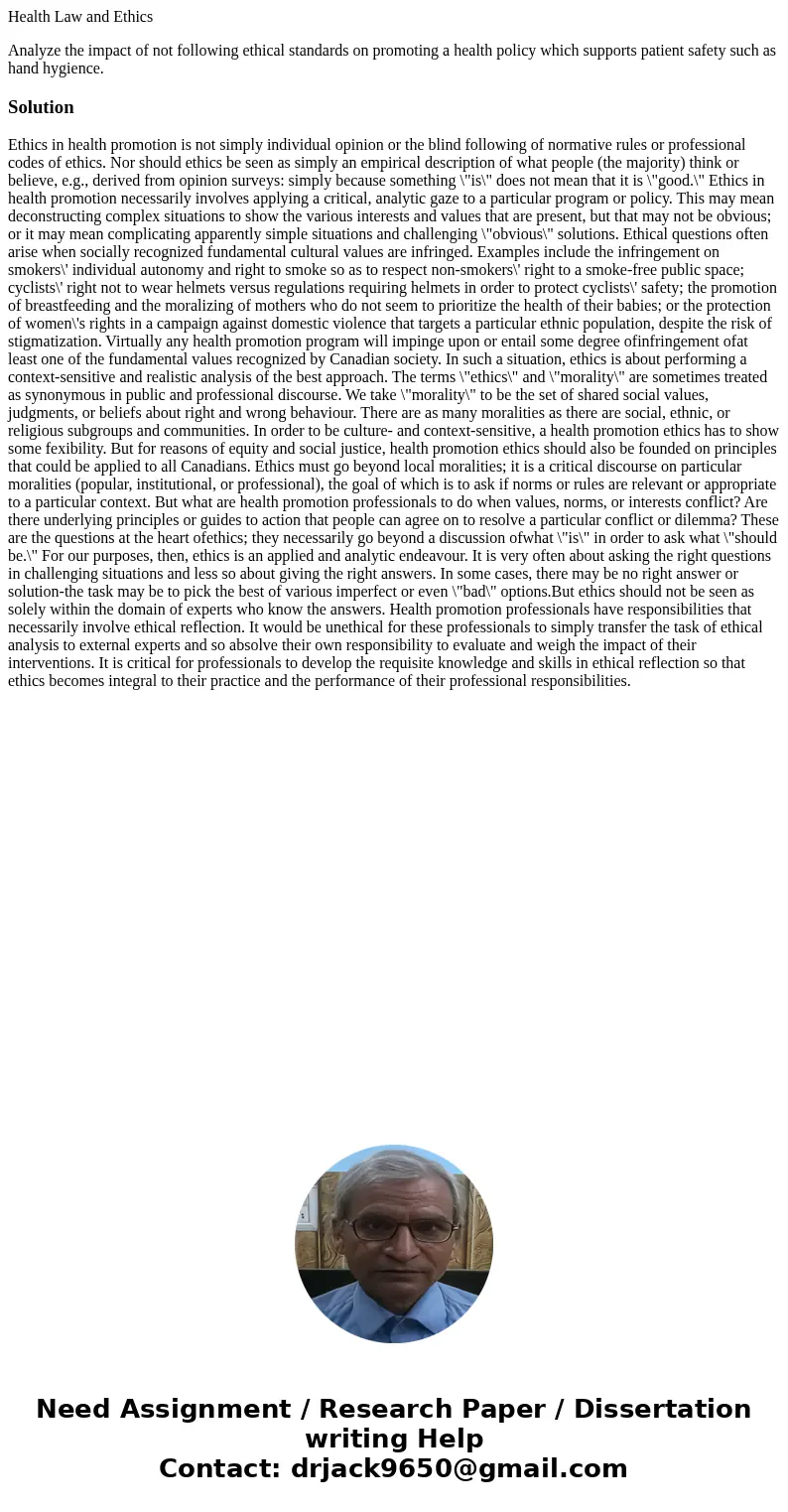Health Law and Ethics Analyze the impact of not following et
Health Law and Ethics
Analyze the impact of not following ethical standards on promoting a health policy which supports patient safety such as hand hygience.
Solution
Ethics in health promotion is not simply individual opinion or the blind following of normative rules or professional codes of ethics. Nor should ethics be seen as simply an empirical description of what people (the majority) think or believe, e.g., derived from opinion surveys: simply because something \"is\" does not mean that it is \"good.\" Ethics in health promotion necessarily involves applying a critical, analytic gaze to a particular program or policy. This may mean deconstructing complex situations to show the various interests and values that are present, but that may not be obvious; or it may mean complicating apparently simple situations and challenging \"obvious\" solutions. Ethical questions often arise when socially recognized fundamental cultural values are infringed. Examples include the infringement on smokers\' individual autonomy and right to smoke so as to respect non-smokers\' right to a smoke-free public space; cyclists\' right not to wear helmets versus regulations requiring helmets in order to protect cyclists\' safety; the promotion of breastfeeding and the moralizing of mothers who do not seem to prioritize the health of their babies; or the protection of women\'s rights in a campaign against domestic violence that targets a particular ethnic population, despite the risk of stigmatization. Virtually any health promotion program will impinge upon or entail some degree ofinfringement ofat least one of the fundamental values recognized by Canadian society. In such a situation, ethics is about performing a context-sensitive and realistic analysis of the best approach. The terms \"ethics\" and \"morality\" are sometimes treated as synonymous in public and professional discourse. We take \"morality\" to be the set of shared social values, judgments, or beliefs about right and wrong behaviour. There are as many moralities as there are social, ethnic, or religious subgroups and communities. In order to be culture- and context-sensitive, a health promotion ethics has to show some fexibility. But for reasons of equity and social justice, health promotion ethics should also be founded on principles that could be applied to all Canadians. Ethics must go beyond local moralities; it is a critical discourse on particular moralities (popular, institutional, or professional), the goal of which is to ask if norms or rules are relevant or appropriate to a particular context. But what are health promotion professionals to do when values, norms, or interests conflict? Are there underlying principles or guides to action that people can agree on to resolve a particular conflict or dilemma? These are the questions at the heart ofethics; they necessarily go beyond a discussion ofwhat \"is\" in order to ask what \"should be.\" For our purposes, then, ethics is an applied and analytic endeavour. It is very often about asking the right questions in challenging situations and less so about giving the right answers. In some cases, there may be no right answer or solution-the task may be to pick the best of various imperfect or even \"bad\" options.But ethics should not be seen as solely within the domain of experts who know the answers. Health promotion professionals have responsibilities that necessarily involve ethical reflection. It would be unethical for these professionals to simply transfer the task of ethical analysis to external experts and so absolve their own responsibility to evaluate and weigh the impact of their interventions. It is critical for professionals to develop the requisite knowledge and skills in ethical reflection so that ethics becomes integral to their practice and the performance of their professional responsibilities.

 Homework Sourse
Homework Sourse